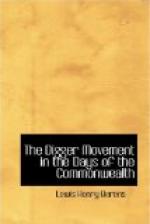“And this is the beginning of particular interest, buying and selling the Earth from one particular hand to another, saying ’This is mine,’ upholding this particular propriety by a law of government of his own making, and thereby restraining other fellow-creatures from seeking nourishment from their Mother Earth. So that though a man was bred up in a Land, yet he must not work for himself where he would, but for him who had bought part of the Land, or had come to it by inheritance of his deceased parents, and called it his own Land. So that he who had no Land was to work for small wages for those who called the Land theirs. Thereby some are lifted up in the chair of tyranny, and others trod under the footstool of misery, as if the Earth were made for a few, and not for all men.”
“As if the Earth were made for a few, and not for all men!” In these few pertinent and indignant words Winstanley strikes the keynote of all his subsequent writings, as that of those of many other later students of social problems, from John Locke,[71:1] who may be regarded as his immediate successor, to Thomas Spence, Patrick Edward Dove,[71:2] Thomas Paine,[71:3] and Henry George.
He then further emphasises his contention, in words similar to those that are to-day resounding throughout the advanced political centres of the world, as follows:
“And let all men say what they will, so long as such are Rulers as call the land theirs, upholding this particular propriety of Mine and Thine, the common people shall never have their liberty, nor the Land be ever freed from troubles, oppressions, and complainings, by reason whereof the Creator of all things is continually provoked. O thou proud, selfish, governing Adam, in this Land called England! know that the cries of the poor, whom thou layeth heavy oppressions upon, are heard.”
And in the closing passage of the chapter he formulates his social ideals in the following words:
“This is the unrighteous Adam, that dammed up the water springs of universal liberty, and brought the Creation under the curse of bondage, sorrow, and tears. But when the Earth becomes a Common Treasury, as it was in the beginning, and the King of Righteousness comes to rule in every one’s hearts, then He kills the first Adam—for Covetousness thereby is killed.
“A man shall have meat and drink and clothes by his labour in freedom, and what can he desire more in Earth? Pride and Envy likewise are killed thereby; for everyone shall look upon each other as equal in the Creation, every man, indeed, being a perfect Creation of himself. And so this second Adam, Christ the Restorer, stops or dams up the running of those stinking waters of self-interest, and causes the waters of life and liberty to run plentifully in and through the Creation, making the Earth one Store House, and every man and woman to live in the Law of Righteousness and Peace, members of one household.”
In a subsequent chapter (chap. vi.) he returns to this subject, and emphasises the differences of the views of the ethical-minded man and the ordinary conventional materialist, in the following suggestive passage:




